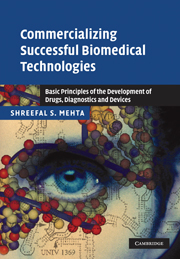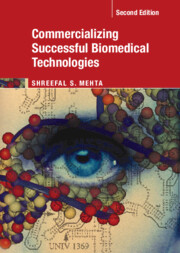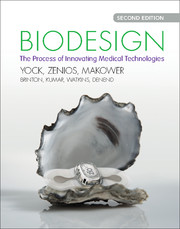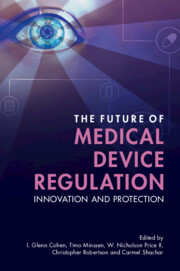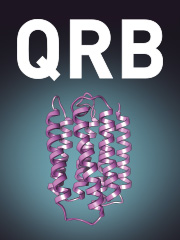Commercializing Successful Biomedical Technologies
Successful product design and development requires the ability to take a concept and translate the technology into useful, patentable, commercial products. This book guides the reader through the practical aspects of the commercialization process of drug, diagnostic and device biomedical technology including market analysis, product development, intellectual property and regulatory constraints. Key issues are highlighted at each stage in the process, and case studies are used to provide practical examples. The book will provide a sound road map for those involved in the biotechnology industry to effectively plan the commercialization of profitable regulated medical products. It will also be suitable for a capstone design course in engineering and biotechnology, providing the student with the business acumen skills involved in product development.
- A robust product development plan is provided through a step-by-step model, from concept to regulated, commercially viable product
- Highlights key business issues taking into account critical business aspects, such as budgetary impact, time constraints and quality control in the development cycle
- Includes learning points and exercises as well as practical case studies and contributions from industry
Reviews & endorsements
"This book is packed with useful details on all aspects of launching a new
biomedical company. I highly recommend it to anyone contemplating a new
venture"
Hanson Gifford, biomedical device entrepreneur and co-founder of The
Foundry
"Dr. Mehta's book is a comprehensive and practical overview of all the steps
and challenges to successfully develop and commercialize a product from
idea to income. His points are illustrated with real life examples
throughout. Students and professionals alike should read this book!"
Jim Mullen, CEO Biogen-Idec and past President of the Biotechnology
Industry Organization
"The book covers all the things that matter but are never written down in a
comprehensive text."
Carmichael Roberts, General partner at Northbridge Partners, Vice
Chairman, WMR Biomedical and cofounder of Surface Logix
"This text covers the commercialization of life science technologies in the
areas of pharmaceuticals, biotechnologies, medical devices, and diagnostics,
and spanning the development process from invention through marketing and
sales. Shreefal Mehta writes clearly and with a practical bent, using case
examples and drawing on his own substantial industry experience to help
chart a path through the complex landscape of new product development."
Paul Yock, Director of the Stanford Program in Biodesign and Professor at
Stanford Graduate School of Business and School of Medicine
"Shreefal Mehta's book provides insights and important information about the
major steps entrepreneurs must take as an idea progresses through the
various steps of commercialization. This text is a must for anyone
developing a new medical product."
Joseph Bronzino, Editor-in-Chief of The Biomedical Engineering Handbook
(CRC Press, 3rd Edition, 2006), and recipient of the IEEE Millennium Medal
for "his contributions to biomedical engineering research and education"
"Dr Mehta's book is on my table as a handy reference and overview of the
business and product development challenges involved in the health care
industry."
Christoph Hergersberg, Global Technology Leader, Biosciences, General
Electric Global Research Center
"Venture philanthropists, venture capitalists, state organizations, and
angel investors involved in building new life sciences-based ventures can
use this book to inform their investment decision making process. Dr Mehta's
comprehensive book helps funding organizations and entrepreneurs identify
the companies and technologies most likely to succeed."
Lesa Mitchell, Vice President, Advancing Innovation, the Ewing Marion
Kauffman Foundation
"Dr Mehta's book is an excellent guide on how to overcome obstacles in
commercializing innovative medical technologies. It covers market research,
intellectual property rights, business models, and regulatory affairs. Of
note are the real life examples, the extensive discussion of Intellectual
Property Rights in relation to business models, and that of interaction with
the FDA for innovative projects."
Dr. Henk van Houten, Senior Vice President Philips Research, Program
Manager Healthcare
"This book is a must for starters in the industry and for people who have
collected different pieces of the puzzle through scattered sources and need
to organize it in their minds to put it in perspective."
Atul Gupta, MIT Sloan School MBA candidate and Kauffman Foundation intern
"The 'How-To Bible' for launching a product - If I had to recommend one
great book to get you started on the road to launching a product, then begin
with "Commercializing Successful Biomedical Technologies."
Joe Sasenick, Washington Biotechnology & Biomedical Association
"Shreefal Mehta's book highlights the right questions to ask in order to
truly understand the impact of reimbursement and health economics, too often
ignored in product development, on new devices, drugs, and biologicals."
Parashar Patel, Vice President, Health Economics & Reimbursement, Boston
Scientific.
"In Commercializing Successful Biomedical Technologies, biomedical academic and entrepreneur Shreefal Mehta highlights the key issues that must be understood to improve the chance of bringing biomedical technology innovation to market...Mehta does an excellent job of identifying and organizing the major issues associated with biomedical technology commercialization in a framework that students, researchers and entrepreneurs can understand."
Michael R Bielski, Nature Biotechnology
Product details
April 2011Paperback
9780521205856
360 pages
244 × 170 × 19 mm
0.57kg
Temporarily unavailable - available from TBC
Table of Contents
- Foreword
- Glossary
- 1. Biomedical device and drug design industry and markets
- 2. Markets of interest and market research steps
- 3. Intellectual property and licensing
- 4. Product development
- 5. Regulatory pathway
- 6. Manufacturing
- 7. Reimbursement and distribution
- Appendices: A. General sources of information (websites, associations)
- B. Alphabet soup of regulatory bodies, regulations and standards
- Index.

